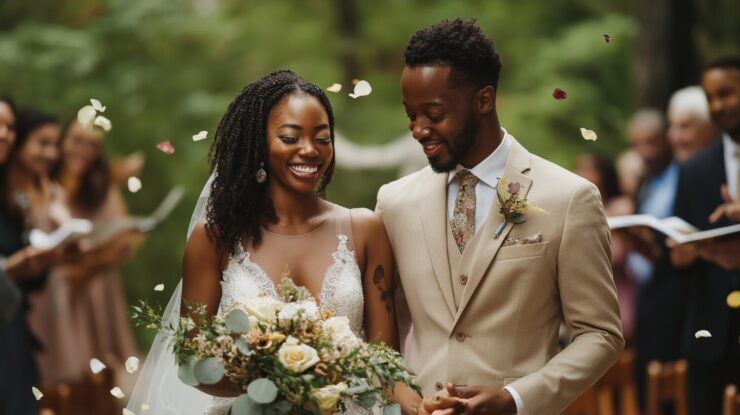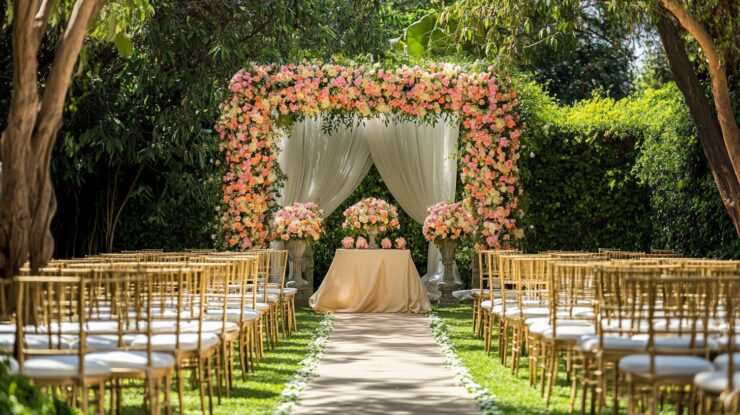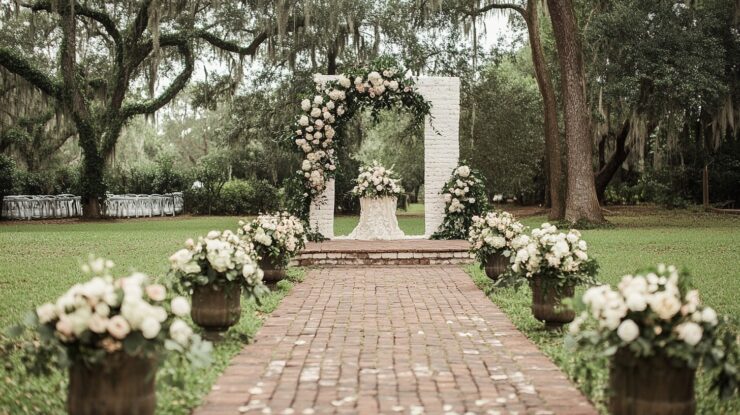Deciding between an elopement and a traditional wedding is a major choice for couples preparing to marry.
Each option comes with distinct experiences, requiring couples to weigh what aligns with their priorities, values, and personalities.
Some dream of an intimate exchange of vows in a scenic location, while others envision a grand celebration with family and friends.
The right decision depends on what feels most meaningful and fulfilling for both partners.
Defining Elopement and Traditional Weddings
When planning a wedding, couples must decide between an intimate elopement or a traditional ceremony with a structured event and a larger guest list.
- Priorities
- Values
- Visions for the big day
Some prefer the quiet simplicity of exchanging vows in a private setting, while others embrace a full-scale celebration surrounded by loved ones.
What is an Elopement?
Elopement has transformed over time, shedding its past association with secrecy and last-minute decisions.
Today, eloping is an intentional choice, offering a personal and meaningful way to exchange vows without the demands of a traditional wedding.
The focus shifts entirely to the couple, prioritizing their commitment without the weight of external influences.
- Elopements typically involve just the couple or a limited number of guests, often fewer than 20.
- Couples have the freedom to marry in settings that hold personal significance, such as mountaintops, forests, beaches, or even city rooftops.
- Without extensive vendor coordination or guest management, planning remains straightforward.
- Couples can craft their vows, incorporate symbolic rituals, or even forgo traditions entirely in favor of something more reflective of their relationship.
- A smaller event translates to reduced expenses, with funds potentially redirected toward travel, experiences, or a honeymoon.
For many, elopement represents a chance to escape the pressure of pleasing others and focus solely on their relationship.
The lack of rigid scheduling allows for spontaneity, offering a relaxed atmosphere with fewer distractions. However, this approach may also mean forgoing certain traditions that some couples hold dear.
What is a Traditional Wedding?

A traditional wedding follows a structured format, bringing together a larger group of family, friends, and acquaintances for a day filled with time-honored customs.
While planning such an event requires considerable effort, many couples find joy in celebrating their marriage with the people who have played important roles in their lives.
- Attendance typically ranges from 50 to several hundred guests, accommodating extended family, friends, and colleagues.
- Weddings are often held at banquet halls, churches, gardens, or luxury resorts, requiring reservations months or years in advance.
- Many couples incorporate customs, religious ceremonies, or symbolic gestures passed down through generations.
- Traditional weddings involve coordinating multiple vendors, managing invitations, and organizing schedules to ensure a smooth event.
- Elegance plays a significant role, with couples selecting attire, floral arrangements, seating plans, and entertainment to create a cohesive experience.
While traditional weddings allow for grand celebrations with family and friends, they also demand significant time, energy, and financial commitment.
The structured nature ensures a well-organized event but may introduce stress, as couples juggle logistics and expectations.
Despite these challenges, many find joy in the shared experience and the ability to honor traditions that hold personal or cultural significance.
Key Factors to Consider When Choosing
Selecting between an elopement and a traditional wedding requires thoughtful reflection on personal preferences, values, and priorities. Each option presents distinct experiences, influencing the budget, guest list, location, and overall emotional impact.
Some couples cherish an intimate exchange of vows, while others dream of a grand event surrounded by family and friends.
Examining these factors can help create a day that feels authentic and fulfilling.
Priorities and Values

The foundation of a wedding decision starts with identifying what holds the most significance for both partners.
- Some couples prioritize a quiet, intimate moment, allowing them to focus solely on each other. An elopement provides this setting, free from distractions or expectations. Others see their wedding as a milestone to be celebrated with loved ones, making a larger gathering more meaningful.
- For many, weddings represent a coming together of families, honoring traditions and shared history. A traditional wedding allows these customs to be woven into the day. In contrast, an elopement often shifts the focus entirely to the couple, placing less emphasis on external influences.
- Public declarations of love may feel exciting for some and overwhelming for others. Eloping offers a private experience, while a traditional wedding involves performing parts of the ceremony in front of an audience.
Couples should consider how much they value family involvement, cultural traditions, and the overall atmosphere of their wedding day before deciding.
Budget Considerations

The financial aspect of a wedding plays a significant role in decision-making.
Costs can add up quickly, making it important to assess what expenses align with long-term financial goals.
- Venue rental and catering
- Photography and Videography
- Wedding attire and accessories
- Decorations and floral arrangements
- Entertainment, such as DJs or live bands
- Stationery favors, and additional event details
Elopement Expenses – Eloping significantly reduces costs but can still require investment, especially for destination ceremonies. Common costs include:
- Travel and accommodation expenses
- Marriage license and officiant fees
- Photography to capture the moment
- Special attire, if desired
- Optional celebration or honeymoon experience
Elopements generally cost between $2,000 and $16,000, depending on the location and elements included. The lower financial commitment allows couples to allocate funds toward meaningful experiences instead of large event logistics.
Guest List and Social Expectations
The number of attendees at a wedding dramatically shapes the atmosphere and experience.
Guest lists typically range between 50 and 300+ people, requiring careful planning. Couples must consider seating charts, catering numbers, and accommodations for out-of-town guests.
The larger the event, the more social obligations arise, including invitations, thank-you notes, and interactions with extended family and friends.
Usually involve fewer than 20 guests or just the couple. Create an intimate setting but may cause disappointment among family members expecting an invitation.
Avoids guest list debates, reducing stress tied to seating arrangements and plus-one policies.
For those who prefer a quiet and personal exchange, elopement removes many of the pressures associated with large gatherings. Couples who enjoy celebrating with family and friends may find a traditional wedding more rewarding.
Location and Venue Options

The setting for a wedding plays a crucial role in shaping the experience.
Require booking venues well in advance, often over a year ahead for popular locations. Common choices include banquet halls, churches, gardens, and hotel ballrooms.
While structured, these settings provide established services, such as seating, catering, and decor coordination.
Offer more flexibility in location selection, with options like mountaintops, beaches, or city rooftops. Can take place at a courthouse, private residence, or a meaningful destination without strict venue policies.
Often allows couples to bypass extensive venue contracts and regulations.
Those seeking a grand, traditional setting may prefer the structured nature of a wedding venue, while those wanting a more flexible or adventurous option may gravitate toward elopement.
Flexibility and Planning Requirements

The level of planning and structure varies significantly between traditional weddings and elopements.
Require extensive coordination with vendors, including photographers, florists, and caterers. Follow a detailed schedule, with designated times for the ceremony, cocktail hour, and reception.
Often demands months of preparation, leading to potential logistical challenges.
Allow for a more spontaneous approach, with fewer moving parts to manage. Offer freedom in choosing the timing and sequence of events. Do not require coordinating multiple vendors or extensive guest accommodations.
Couples who prefer structured planning and detailed coordination may appreciate a traditional wedding, while those seeking a relaxed, low-pressure experience may find elopement more appealing.
Stress and Emotional Considerations

The emotional aspect of wedding planning often influences the overall experience.
It can lead to stress due to guest expectations, family involvement, and logistical hurdles. Require balancing multiple opinions, which may create pressure to conform to traditional norms.
Can cause emotional exhaustion, particularly when trying to meet external expectations.
Remove the complexities of managing a large event. Allow couples to focus solely on each other, eliminating outside pressures. Offer a more relaxed experience, often free from social obligations.
For couples who thrive in a structured, celebratory environment, traditional weddings provide an exciting gathering. Those looking for a more peaceful, intimate experience may prefer elopement.
Summary
There is no universal answer to choosing between an elopement and a traditional wedding.
The decision should be based on what feels right for the couple. Prioritizing personal happiness over societal expectations ensures a wedding experience that reflects the love and commitment shared between two people.

